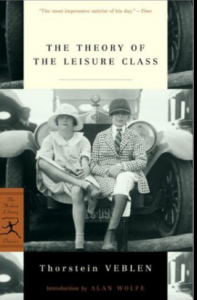12 Jan Wealth & Mental Class: Thorstein Veblen and the Theory of the Leisure Class
 Re: Wealth & Mental Health
Re: Wealth & Mental Health
Over the holidays, I found myself re-visiting Thorstein Veblen’s The Theory of the Leisure Class (1899). While Veblen’s work was rejected by the elite institutions he challenged, his core concepts have endured and are highly relevant to my work at the intersection of wealth and mental health.
Challenging Adam Smith’s claim that consumers are completely rational in pursuing self interests, Veblen observed people spend money- irrationally- to gain access to the elite power structures they believe will provide security and validation in an unsafe and chaotic world. To describe this phenomenon, Veblen coined the phrase conspicuous consumption and provided the foundation for what has become the field of behavioural economics.
As a clinician and advisor to individuals and families of wealth, I also observe how irrational financial decisions in the context of clinical care are too often based on the aspirational promises of self aggrandizing service providers rather than clinical substance.
Culturally trained to believe money solves all problems, desperate families throw extraordinary sums of money at an identified patient by seeking the most expensive and elite care providers. In this regard, they conspicuously consume by paying exorbitant prices far in excess of their productive value.
Through my work and research, I’ve found the most expensive services providers are not always the most clinically indicated or the best in addressing the systemic issues that keep patients and families trapped in their mental illnesses.
In the realm of mental health and wealth, liberation is found in clinically effective and culturally competent care that involves the following three components:
1. Recognizing the power of wealth exists along a spectrum from healthy to pathological.
2. Acknowledging an identity of wealth is significant and defined by cultural markers of isolation, suspicion of outsiders, and hyper-agency.
3. Creating and working in a therapeutic alliance that enables the patient to come forward with their full identity rather than using their wealth as a shield to keep people away and avoid the consequences of their impaired functioning.
It’s an art based on science and one that is taking hold amongst innovative clinicians and family governance professionals around the globe.
As we move into 2025, let’s remember that #mentalhealthmatters 4 everyone, everywhere at every point on the economic spectrum. Let’s also be aware that mental wellness for individuals and families of wealth is provided through clinical and cultural competency, not sparkling but empty promises.
www.draysonmews.com
www.drhokemeyer.com


Sorry, the comment form is closed at this time.